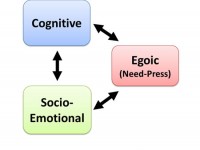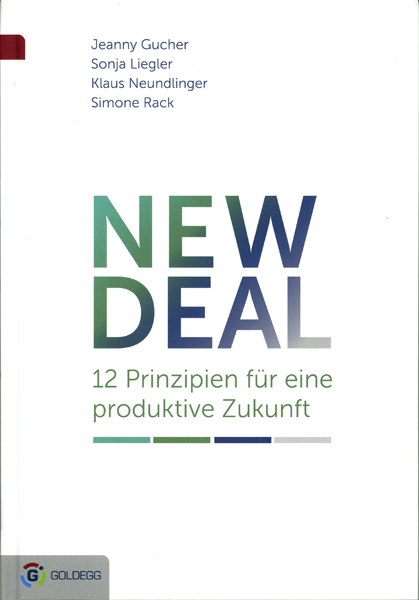The papers collected in this blog center around the topic of complex thinking as a hallmark of individual freedom, organizational effectiveness, and societal well-being. They all focus on Lebensbefreiung, the unburdening from needless linear clutter in the mind and the obfuscation of communication. The articles point to, and explicate, a tradition of deep thinking that in the Western tradition began with Plato and survived to the time of Hegel and Heidegger, but through the onslaught of social media and simplistic 'agile' tool kits is presently at risk of being disavowed and forgotten, not only in education, but in training and management. The research reported in these papers is based on DTF, the Dialectical Thought Form Framework (Laske 1999, 2008, 2015, see publications at https://interdevelopmentals.org/publications/). DTF is a synthesis and refinement of work done by Basseches (1984), Bhaskar (1993), and Jaques (1994). It was born of the need to gain a comprehensive concept of adult development that has gone missing in the work of Loevinger, Kegan, and other 'developmental' researchers and their followers (like Wilber) by one-sidedly focusing on social-emotional, not also cognitive, development. By contrast, DTF transcends meaning-making toward sense-making both of which are needed to understand adult development in... Read More...
Category: Dialectical Thinking
CDF auf Deutsch: Sozialwissenschaftliche Texte zur Lebensbefreiung und Erhoehung der Arbeitsproduktivitaet
In diesem Blog stelle ich die wichtigsten der von mir seit 2004 deutsch geschriebenen sozialwissenschaftlichen Texte und Lernmaterialien zusammen. Sie betreffen thematisch, was ich Lebensbefreiung nenne, in dem Sinne, dass sie es dem Leser ermoeglichen, sein oder ihr eigenes Leben entwicklungsmaessig in tieferer Weise als bloss psychologisch zu verstehen, naemlich auf 'epistemische' Weise, die die Art und Weise betrifft, in der sich jeder von uns seine eigene Welt schafft. Die Texte zeigen, wie jeder von uns eine lebenslange Entwicklung durchlaeuft, welche die dramatischen Veraenderungen unserer Erfahrung der realen Welt ("Wirklichkeit") als von uns selbst konstruiert, und also auch als von uns selbst verantwortet, darstellt. Sie enthalten zudem eine Ideologiekritik sowohl positivistischer wie spiritualistischer Ansaetze zur Erklaerung unseres Lebenslaufs und unserer Lebensprobleme. Methodologisch gesehen betreffen diese Schriften meine Arbeit mit dem Constructive Developmental Framework (CDF, 2000), einer sozial-wissenschaftlichen Methodologie, die human resources insofern revolutioniert, als sie erstmalig empirische Daten zum persoenlichen Entwicklungsstand von Mitarbeitern in Unternehmen zur Verfuegung stellt, die eine Grundlage nicht nur von Coaching, sondern auch von Karriereberatung und Team-Aufstellung werden koennen. Zudem leisted CDF auch im Privatleben Hilfestellung einfach deswegen, weil es zu einem Verstaendnis des persoenlichen Entwicklungsverlaufs und Entwicklungsstandes beitraegt, das weder von der Psychologie noch von... Read More...
Can Coaches Nurture and Increase Team Maturity?
Since 2015, webinars and courses at IDM have addressed the developmental structure of teams and central issues of team coaching. Specifically, they have clarified notions such as 'self organization' in teams and their ability to develop 'collaborative intelligence'. The perspective taken has been adult-developmental, to the effect that self organization of teams is anchored in the self organization -- thus the maturity -- of individual team members, rather than being a mysterious quality of whatever team. The perspective greatly differentiates interventions that make sense with teams from a merely behavioral vantage point. Team coaches need to address two dimensions of self organization: the social-emotional and cognitive one which broadly overlap and influence each other. The teaching of team coaching has been based on Laske's social-emotional team typology that distinguishes three levels of team maturity. On each of these levels, a team is either downwardly or upwardly divided as a function of the relative maturity of team minority or majority. Clearly, each such team necessitates taking a different approach to intervention. The attached set of slides details the CDF team typology. The typology distinguishes 6 types of teams, or 'We-Spaces', 3 of them up-, and 3 of them down-wardly divided. The... Read More...
Zur Durchdringung organisatorischer Beratung mit Einsichten aus CDF
In diesem Artikel fuehre ich im Einzelnen die Geschichte und die Eigenart des Constructive Developmental Framework (CDF) aus. Ich moechte zeigen wie insbesondere ein soziologischer Beratungsansatz wie New Deal (Gucher 2015), aber auch aehnliche Beratungsvorgehen, durch Einsicht in die lebenslange Entwicklung von Menschen vertieft und im Dialog mit Kunden flexibel werden koennen. Der Nachdruck im Text liegt darauf, dass alle Dimensionen von Sozialkapital -- persoenliche Beziehungen, Emotionen, Aufmerksamkeit und Wissen -- in ihrer Bestehensweise und Verwendung entschieden von dem Reifegrad von Individuen und Teams abhaengen. Dies legt nahe, die auf New Deal beruhenden Interventionen durch sozial-emotionale und kognitive Werkzeuge aus CDF zu bereichern und dadurch zu staerken. Insbesondere erhoeht man durch CDF die Dialogfaehigkeit von Gruppen und Teams und staerkt das fuer eine kollaborative Arbeitsweise notwendige gegenseitige Vertrauen. Der Artikel behandelt sowohl wie man CDF durch Gruppenarbeit am Interdevelopmental Institute erlernt und wie man das erlangte Wissen in Kundenberatung und Coaching einfuehren kann. Anfragen ueber Lehrweise und Kosten der CDF Ausbildung zur dialogischen Beratung bitte an Otto Laske, otto@interdevelopmentals.org, richten. Durchdringung des New Deal mit CDF Feb. 2018 Read More...
Introduction to “Dynamic Collaboration: How to Strengthen Self-Organization and Collaborative Intelligence in Teams” (Jan De Visch & Otto Laske 2018)
This blog gives readers access to the Introduction to Jan DeVisch's and my book entitled Dynamic Collaboration: How to strengthen self organization and collaborative intelligence in teams, to be launched in May 2018 at the University of Antwerp, Belgium. In this book of five chapters, we deviate from the extant team literature by adopting an adult-developmental perspective and instead of "skills", "competences", and "agile" mantras and tool kits focus on the structure and quality of team dialog as the source of self-organization both in individuals and teams. We equate self-organization with being mature enough to be aware of the structure of one's emotions and thoughts as an expression of the level of one's adult development. To provide senior managers with new ways of thinking about teams and new kinds of interventions derived therefrom, we show that teams are always developmentally mixed -- composed of different developmental levels -- and dependent upon how team majority relates to team minority, are prone to being either up- or downwardly divided, rather than unified. We put at the disposition of senior managers a large set of tools unknown to them that derive from adult-developmental research at Harvard's Kohlberg School since 1975, showing them how... Read More...
NEW DEAL: A sociological consulting approach to humanistic management and deliberately developmental organization
This blog introduces a sociological approach to consulting to organizations, with a focus on social capital (Sozialkapital) as the indispensable foundation of value creation and social productivity. The approach, called New Deal, formulated in German (Gucher et al, 2015), is the fruit of new social science research, and is sponsored by Four Dimensions GmbH active in Vienna and Salzburg, Austria. New Deal represents a sociological approach in the sense that it sees work and value creation as a process by which social capital is constantly created as well as potentially destroyed in human interactions. To substantiate this insight New Deal introduces four "new economies" (not found in classical economy): of personal relationships, emotions, attention, and knowledge, respectively. According to this approach, managing the creation of social capital amounts to managing the four economies at all levels of an organization, whether it is hierarchical or not. The blog highlights what is fresh about New Deal in light of North American preferences for focusing on "getting the job done", or remaining in what CDF calls the "Task House". Reflecting on the New Deal approach from an adult-developmental perspective, the blog elucidates why "moving out of the Task House" is a requirement especially... Read More...


